What I Don't Think About Anymore
A story of reflection and acceptance, from the co-proprietor of New Orleans’ famed Commander’s Palace

Karlotta Freier
The thing about journals is that they remind you of things that were once so intense that they were never far from your thoughts. Then one day, you glance at a very old journal, and you realize that you don’t even think about them anymore.
I grew up in a prominent New Orleans restaurant family in the ’60s, ’70s, and ’80s. Being gay and closeted was core to my life and colored how I saw the world. Lesbians were unheard of, and if you did hear whispers about them, they tended to “move away.” Daily, hourly, the burden was on me to figure out how to maneuver everyday situations, because holding my girlfriend’s hand in public could get me beaten up or worse. The first time I did that in broad daylight, I nervously looked over my shoulder. Shaking, but with a smile that likely made me look gay and kind of wacky.
Related:Paxx Caraballo Moll: Inclusive Kitchens Are Possible and They Work
Recently, some younger people I work with have asked me about being gay and whether I was OK making that more known. My first thought was, “Who doesn’t know?” But glancing at some old journals revealed to me that for a large part of my life, I had been tangled in a mental web: “How do I tell my family? When? Will they disown me? Shun me?”
Back then, young women whose families (or fathers) were in certain Carnival krewes were expected to participate in very formal social events and have a date — with a boy. Resisting these rites was futile. There were constant questions about who you were dating. Coming around the corner and inadvertently hearing gay jokes, I had to laugh along or be found out.
I heard about Stonewall and the way it ignited the gay community. A riot after another raid on a bar where the dykes, drag queens, and gay men had enough that night in NYC in 1969. Some years later, I left a group I was with on a business trip just to go see it for myself. A plaque? That’s what we got? But it was on Christopher Street. I have never seen more rainbow flags in my life and at the time I didn’t even know what it stood for. These people were being “out and proud” before that was a thing. It gave me hope.
The only place I could really be myself was in a room full of other gay people, each carefully vetted and led in by someone we trusted.
In college, I snuck around the library looking for books about homosexuals. Being gay was inevitably described as a disease, and there were therapies to “fix” it. There was no internet then. Information was hard to come by. The only place I could really be myself was in a room full of other gay people, each carefully vetted and led in by someone we trusted.
In 1983, I made a pilgrimage to Maude’s in San Francisco, walking past it four or five times before I had the nerve to go in, but I told myself, I am from New Orleans and I like a good dive as much as the next girl. Lots of the women inside looked like men. Why did that woman with the crew cut need 50 keys on a chain on her jeans? Several gals came and made small talk before my anxiety got the better of me. I bolted.
Related:'The L Word: Generation Q' Showrunner Marja-Lewis Ryan Cooks for Her Chosen Family
President Ronald Reagan refused to even say the word AIDS until 1985 when thousands of gay men had died. The celebrities who did support the community and raise money did make a difference. Growing up, Rock Hudson and his boyfriend Marc were at our home many times with our family friend, the film director Ross Hunter and his lifelong boyfriend, costume designer Jaque Mapes. Rock and I talked about Lean Cuisine. He got sick and he died the same year Reagan finally spoke. My anger built amidst the grief I felt for Rock and so many friends. I gave to causes, I worked at the AIDS Walk that my best friend Helen ran. I was still angry at myself and the world for being gay and I was learning how to deal with it, still in silence.
When I was 29 years old, I rather formally invited my Aunt Dottie to coffee — not something we ever did, since we were together a lot. She was always a progressive, accepting thinker. I deeply admired her. When I nervously said, “I’m gay, ” my stomach was doing flips at the thought of being rejected by her. She replied, “Oh Ti, I’ve known that since you were four.” Wish you would have told me, was my first thought.

Karlotta Freier
Then one day in 1992, Mike Theis and Robert Ripley, whom I only knew from a quick hello at parties, asked for a meeting. We sat at the sidewalk café in front of the restaurant I ran with my cousins, and they cut to the chase, asking me to be cochair of the Human Rights Campaign dinner — an event to benefit the country’s largest LGBTQ+ advocacy group.
“Why me?”
“Because you are the only one we know who can’t get fired.”
Well, the way I saw things, nothing could be further from the truth. I had been told that my family and most other people wouldn’t want to be in business with me if I were openly gay. I had two options: pass and always know I had let the gay community and myself down, or go for it, and hope my gay friends would support me even if others didn’t.
I would find out over the years that my family had my back, always had and always will. But that was of no help at the moment. Imagine thinking, as I did, that if I did this one thing — a charitable thing, no less — I could lose a chunk of my family, and the career I’d chosen.
I said yes on one condition: It had to be the best damn dinner that New Orleans had ever seen.
Related:We Must Protect Queer Spaces at All Costs
Mike and Robert had plans — a glamorous patron party with a big curtain that would open onto the grand ballroom, decorated to the hilt. And they wanted me to ask Mary Landrieu, our U.S. senator, to speak.
“Wait…what???”
The HRC said it would be the first time a sitting senator had ever attended an openly gay event in the U.S. "You know her, right?” they asked me.
I asked how much they’d raised at past events (just $25,000, which was peanuts compared to less taboo causes) and who the sponsors had been (only beer companies, because no one else would get near the gay community). I decided to go to the most important businessman in the state, who also happened to be our company’s banker. If it went poorly, I would risk that busi-ness relationship and the wrath of my family. But I had a hunch that he was forward-thinking and, more importantly, a leader.
My co-chair, Robert, was late, but he arrived in a suit like I'd told him to, glitter all over his face.
“That’s why I was late,” he said. “We had the Gay Mardi Gras Ball last night and I couldn’t get some of it off…”
“Miss Martin, come right this way.”
We asked this businessman for $5,000. He gave us $10,000. Other sponsors followed. We raised $100,000. On the big night, our emcee, comedian Georgia Ragsdale, found herself working with neither a script (the writer had flaked) nor the hairdresser she’d asked for. She quipped, “A room full of queens and you tell me there’s no hairdresser?” While I was stranded alone on stage in front of 600 people, Robert had arranged to sashay into the ballroom followed by a spotlight. The man certainly knows how to make an entrance.
Later, I stood in the back watching our U.S. senator speak to the crowd. The aforementioned giant curtain tipped forward onto the senator, and while gym buffs held up the pipe and drape, she crawled out from under, making a perfect joke about her then-competitor for office.
“I think it’s going well, don’t you Robert?” I said.
Doing things that scare me is good for me. Nothing that really matters to me comes easy.
This proved to be one of the first of many successful gay rights events over the years in New Orleans, as businesses, sponsors, and citizens all came around. I’m sure it would have happened over time, and I want to honor the people who have done so much more than me, but my little part in nudging things forward felt good. Doing things that scare me is good for me. Nothing that really matters to me comes easy.
But it does feel like the amazing progress of the past 15 years is slipping away. To honor all the brave gay people who came before me and to help the ones coming along now, I want to help. I want to be brave.
On April 15, 2022, I got engaged to my fiancée, Leslie. Family and friends from around town and all over celebrated us. We held hands. I didn’t even think about it.
Editor's Note: Due to editing errors, the wrong essay appeared on p. 28 of our June 2023 issue. Food & Wine sincerely regrets the error, and we are publishing Ti Martin's essay as she intended it here.
For more Food & Wine news, make sure to sign up for our newsletter!
Read the original article on Food & Wine.

